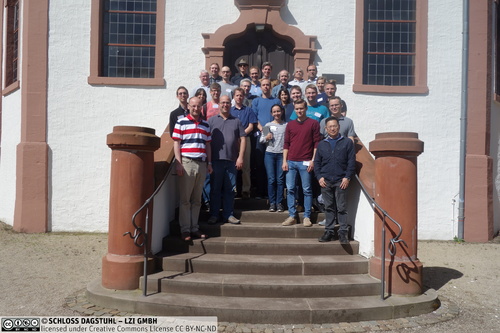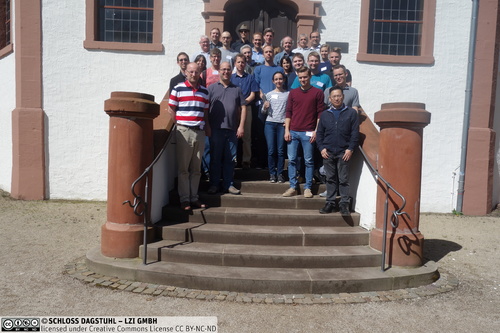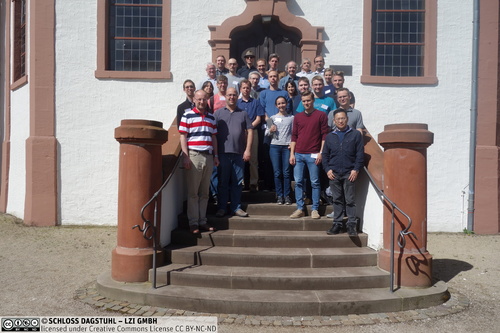Dagstuhl Seminar 18152
Blockchains, Smart Contracts and Future Applications
( Apr 08 – Apr 13, 2018 )
Permalink
Organizers
- Foteini Baldimtsi (George Mason University - Fairfax, US)
- Stefan Katzenbeisser (TU Darmstadt, DE)
- Volkmar Lotz (SAP Labs France - Mougins, FR)
- Edgar Weippl (Secure Business Austria Research, AT)
Contact
- Shida Kunz (for scientific matters)
- Annette Beyer (for administrative matters)
In its beginnings, the technical and socio-economical feasibility of Bitcoin was met with much skepticism; however, this has since changed as both research and practice have outlined the merits of distributed ledger technologies, commonly referred to as “blockchains”. Possible applications of blockchains reach from decentralized settlement layers over complex smart contract systems to tailored authenticated data structures that implement systems for identity or supply chain management. Nevertheless, beyond the immediate opportunities and applications lie many open questions regarding the long-term perspective of both permissionless and permissioned blockchain technologies. For example, while scalability and sustainability are currently topics of active research and development, other aspects such as usability, interoperability and cryptoeconomics have received considerably less attention. In order to anticipate and address future key topics and questions related to blockchain technologies, this seminar strives to provide an interdisciplinary breeding ground.
We will focus on future applications and developments of this technology and discuss how such complex systems can thrive over a long period of time. Thereby, we start our seminar by outlining and collecting current and potentially future issues from the diverse viewpoints of the participants. These issues include not only current limitations of the underlying technologies, but also problems encountered in real-world applications.
As an example, consider the various social, economic, legal and technological uncertainties and problems that have arisen as a consequence of the recent contentious forks in both the Bitcoin (August 2017) and Ethereum (July 2016) networks. While the possibility of such forks was previously well known, it can be argued that provisionary measures and research on effectively dealing with them was immature and could have been addressed much sooner. In any case, the ramifications of these events have and will continue to influence the discussion and development of blockchain technologies.
After establishing the relevant issues, they are grouped into approximately five categories and will serve as a rough guideline for the rest of the seminar. Based on these categories, subgroups of participants will be formed to discuss a specific set of topics. Over the course of the seminar, participants are encouraged to move between groups and provide input to various topics. We thus hope to enrich the discussion with different viewpoints and facilitate a rewarding range of outcomes. The goal of the seminar is to develop a shared and open agenda that shapes and directs research and development in the area of distributed ledger technologies to face current and future challenges as well as contribute to the positive development of this field.
In terms of daily schedule, we plan to strike a balance between group discussions (approx. two hours per session) and individual working time in order to give the participants opportunity for exchange as well as reflection. Short presentations given by participants to fuel a debate are welcome. In accordance with the philosophy of Dagstuhl seminars, we want to provide a balanced and inspiring environment for thought and discussion.
 Foteini Baldimtsi, Aljosha Judmayer, Stefan Katzenbeisser, Volkmar Lotz, Nicholas Stifter, Edgar Weippl, and Alexei Zamyatin
Foteini Baldimtsi, Aljosha Judmayer, Stefan Katzenbeisser, Volkmar Lotz, Nicholas Stifter, Edgar Weippl, and Alexei Zamyatin
In its beginnings, the technical and socio-economical feasibility of Bitcoin was met with much skepticism; however, this has since changed as both research and practice have outlined the merits of distributed ledger technologies, commonly referred to as "blockchains". Possible applications of blockchains reach from decentralized settlement layers over complex smart contract systems to tailored authenticated data structures that implement systems for identity or supply chain management. Nevertheless, beyond the immediate opportunities and applications lie many open questions regarding the long-term perspective of both permissionless and permissioned blockchain technologies. For example, while scalability and sustainability are currently topics of active research and development, other aspects such as usability, interoperability and cryptoeconomics have received considerably less attention. In order to anticipate and address future key topics and questions related to blockchain technologies, this seminar strove to provide an interdisciplinary breeding ground.
The participants focused on future applications and developments of this technology and discussed how such complex systems can thrive over a long period of time. Thereby, we started our seminar by outlining and collecting current and potentially future issues from the diverse viewpoints of the participants. These issues include not only current limitations of the underlying technologies, but also problems encountered in real-world applications.
As an example, we considered the various economic, legal and technological uncertainties and problems that have arisen as a consequence of the recent contentious forks in both the Bitcoin (August 2017) and Ethereum (July 2016) networks. While the possibility of such forks was previously well known, it can be argued that provisionary measures and research on effectively dealing with them was immature and could have been addressed much sooner. In any case, the ramifications of these events have and will continue to influence the discussion and development of blockchain technologies. Beside establishing the relevant issues through numerous talks, subgroups of participants were formed to discuss a specific set of topics. Over the course of the seminar, participants were encouraged to move between groups and provide input to various topics. We hope to have thus enriched the discussion with different viewpoints and to have facilitated a rewarding range of outcomes; at the point of writing, two papers directly resulting from this Dagstuhl seminar are submitted for review. The goal of the seminar was to develop a shared and open agenda that shapes and directs research and development in the area of distributed ledger technologies to face current and future challenges as well as contribute to the positive development of this field.
The talks and working groups of this first Dagstuhl seminar on Blockchains, Smart Contracts and their future applications focused inter alia on the following topics:
- current and future protocols, including alternative consensus protocols
- governance
- interdisciplinary aspects of Blockchain technology (economy, law)
- cross-chain communication
- scalability and costs
- Goldfinger and other attack vectors
 Foteini Baldimtsi, Stefan Katzenbeisser, Volkmar Lotz, and Edgar Weippl
Foteini Baldimtsi, Stefan Katzenbeisser, Volkmar Lotz, and Edgar Weippl
- Foteini Baldimtsi (George Mason University - Fairfax, US) [dblp]
- Alex Biryukov (University of Luxembourg, LU) [dblp]
- Rainer Böhme (Universität Innsbruck, AT) [dblp]
- Jan Camenisch (IBM Research-Zurich, CH) [dblp]
- Samuel Christie (North Carolina State University - Raleigh, US) [dblp]
- Ittay Eyal (Technion - Haifa, IL) [dblp]
- Sebastian Faust (TU Darmstadt, DE) [dblp]
- Peter Gazi (IOHK - Hong Kong, HK) [dblp]
- Dieter Gollmann (TU Hamburg, DE) [dblp]
- Raimund Gross (SAP SE - Walldorf, DE)
- Bernhard Haslhofer (AIT Austrian Institute of Technology - Wien, AT) [dblp]
- Aljosha Judmayer (SBA Research - Wien, AT) [dblp]
- Stefan Katzenbeisser (TU Darmstadt, DE) [dblp]
- Kwok-Yan Lam (Nanyang TU - Singapore, SG) [dblp]
- Juho Lindman (University of Gothenburg, SE) [dblp]
- Volkmar Lotz (SAP Labs France - Mougins, FR) [dblp]
- Sarah Meiklejohn (University College London, GB) [dblp]
- Bart Preneel (KU Leuven, BE) [dblp]
- Alessandra Scafuro (North Carolina State University - Raleigh, US) [dblp]
- Philipp Schindler (SBA Research - Wien, AT) [dblp]
- Sofie Schock (Universität Wien, AT)
- Nicholas Stifter (TU Wien, AT) [dblp]
- Thorsten Strufe (TU Dresden, DE) [dblp]
- Edgar Weippl (Secure Business Austria Research, AT) [dblp]
- Alexei Zamyatin (Imperial College London, GB) [dblp]
- Aviv Zohar (Hebrew University - Jerusalem, IL) [dblp]
Classification
- security / cryptology
- society / human-computer interaction
- software engineering
Keywords
- Blockchains
- Smart Contracts
- Cryptographic Currency
- Incentive Engineering
- Consensus Algorithms




 Creative Commons BY 3.0 DE
Creative Commons BY 3.0 DE
